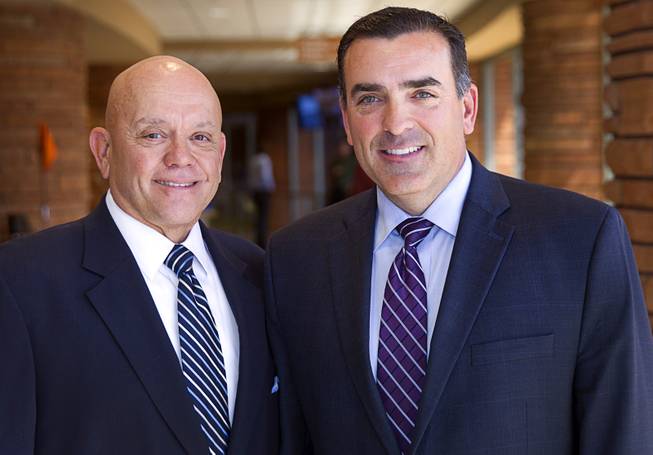
Outgoing Clark County Coroner Michael Murphy, left, poses with new coroner John Fudenberg after Fudenberg’s official appointment at the Clark County Government Center Tuesday, April 21, 2015. Fudenberg has served as assistant coroner since 2003.
Thursday, April 30, 2015 | 2 a.m.
When John Fudenberg joined the Clark County Coroner's Office as an assistant coroner in 2003, he had a long history in law enforcement but little experience in the unique world of investigating death.
Fudenberg joined the office to continue working as the second-in-command to Michael Murphy, his boss when both were employed by the city of Las Vegas as marshals. Murphy had been appointed coroner in 2002.
In his 12 years with the coroner's office, Fudenberg has been responsible for overseeing the department's day-to-day operations and says he has learned the job is a lot more than just investigating unnatural deaths.
"We at the coroner's office are not necessarily in business of death," he said. "We're in the business of life, and the way we work with families and touch the lives of so many is an incredible process."
With Murphy moving on for a new job with the National Center for Missing and Exploited Children, Fudenberg was chosen last week by Clark County Commission to take over the office as the fourth coroner in the county's history.
The Las Vegas Sun spoke with Fudenberg to learn about his new role and how he plans to make his mark on the coroner's office:
Can you explain a little bit about what the coroner's office does?
Nobody really knows what the coroner's office does unless they're exposed to it, and even then you only get a small taste of what they do. We investigate any unnatural death, any death that's something other than a natural death that occurs under the attendance of a physician. We have 30 medicolegal death investigators who are working 24 hours a day, seven days a week. They're responding to the scenes (where deaths have occurred). They do what we refer to as a concurrent investigation with law enforcement. It's very important that we remain independent from the police and that we do neutral investigations. We're not advocating for the defense. We're not advocating for the prosecution. We're stating the facts.
What have you learned about working in the coroner's office that you didn't know when you joined 12 years ago?
The one thing that I really didn't know is the compassion that our staff are required to have when they're in this line of work. Our medicolegal death investigators are 50 percent detectives and the other 50 percent of the job they're social workers. In one minute they're investigating a horrific homicide and the next minute they're notifying the family members of the victim of that homicide. The family may be embracing them and crying on their shoulder. It takes a very unique group of people to be able to flip that switch.
How has the job of the coroner changed during your time there?
I think the technology and the expectations of the legal process and of the community has changed a lot. We have a lot of technology today that we didn't have 12 years ago. When I started, DNA was virtually nonexistent and now we have DNA at our fingertips.
What will be different about your job now that you've been promoted from assistant coroner to coroner?
My role is going to be to continue the processes that we've put into place for the last 12 years and make sure I take our office to the next level. Mike (Murphy) is a great leader and I learned a lot under his leadership, but I don't plan on trying to replace him because you can't. The reason he and I were so successful working together is because we're different. We had different styles — he's more dynamic while I consider myself more calculated. I'm not looking to replace Mike Murphy as much as I'm looking to put my mark on the organization.
How do you see the coroner's office growing and changing in the coming years?
One of the things I really plan on doing is with the UNLV medical school coming online, integrating (the coroner's office) with the academic world. I've met with the dean of the new UNLV medical school and we've talked about partnering. There are a lot of coroner medical examiner offices across the country that have close relationships with university medical schools. We are exploring the development of a forensic pathology fellowship program which would bring doctors to our community and we could train doctors in our office. We've already formed in the last two or three years a very close relationship with UNLV School of Dental Medicine and we're working on a partnership with anthropology department at UNLV. Integrating with the UNLV medical school would be a great partnership that would benefit entire community.
What to you like to do when you're not on the job?
One of the things we talk a lot about with our staff is employee wellness. They see things every day that 99 percent of the population will never see in their entire life, so we try to stress that our staff have lives outside of the office. You should have hobbies and people you spend time with so you can refresh and stay mentally healthy. I personally make that a priority. I have a 13-year-old daughter I spend a significant amount of time with. I love to travel. I love to golf, I love to snow ski. I grew up all my life playing hockey. I was born and raised in Minnesota, and that's sort of what you do in Minnesota.

Join the Discussion:
Check this out for a full explanation of our conversion to the LiveFyre commenting system and instructions on how to sign up for an account.
Full comments policy